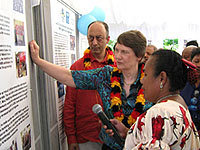
Feature Story
UNDP Head Helen Clark highlights importance of gender equality for Papua New Guinea to achieve MDGs
22 February 2010
22 February 2010 22 February 2010A version of this story first appeared at undp.org

United Nations Development Programme Administrator Miss Helen Clark paid a three-day visit to Papua New Guinea to highlight significant opportunities which exist to promote investment in public service delivery, empower women, and advance the country's development agenda.
Credit: UNDP
United Nations Development Programme Administrator Miss Helen Clark highlighted HIV issues during her visit to Papua New Guinea (PNG). In her meetings with senior government and other officials, she underlined that “the United Nations development system stands ready to continue working with the Government and the people of Papua New Guinea in overcoming existing development challenges and accelerating progress towards the Millennium Development Goals, especially in areas such as education, health, advancing women’s empowerment and combating HIV/AIDS epidemic.”
At the UNDP Leadership Development Programme on HIV run by the Friends Foundation in the Gerehu suburb Miss Clark praised the programme for supporting people to back to their communities to find innovative ways to respond to the AIDS epidemic. Programmes include includes supporting orphans and reducing stigma and discrimination. She also met with one of three family sexual violence units at the Boroko police station in Port Mores which assists survivors of gender-based and domestic violence.
The sad truth is that where we see progress towards the MDGs lagging the most is often where the needs and status of women and girls are accorded low priority.
United Nations Development Programme Administrator Miss Helen Clark
Miss Clark launched the Second National MDG Progress Report together with the Minister for National Planning and District Development, Mr Paul Tiensten. As the report highlights, Papua New Guinea is currently off track to meet the Millennium Development Goals, including in areas of responding to HIV, reducing child and maternal mortality, and promoting gender equality.
“The sad truth is that where we see progress towards the MDGs lagging the most is often where the needs and status of women and girls are accorded low priority,” she said.
At the inauguration of the National Women’s Forum on Equality and Participation for Women: a Better Future for Papua New Guinea, which Miss Clark co-chaired with the Minister for Community Development, Dame Carol Kidu, the discussion focused on the need to increase women’s voices and participation in politics as a critical means to promote democracy, advance gender equality, and achieve sustainable and inclusive development.
Women in decision-making has been a critical issue in Papua New Guinea against a backdrop of a high level of gender-based violence coupled with high rates of HIV among women and girls between the ages of 15-29 years. Papua New Guinea currently has only one female Member of Parliament, and efforts are underway to reserve 22 seats for women in Parliament.
“Efforts to promote gender equality, including promoting girls’ education, improving maternal health, combating gender-based violence, and securing female representation in government leadership positions, are of critical importance to advance development in Papua New Guinea,” said Miss Clark. “Unleashing the potential of Papua New Guinea means giving women the same opportunities in life as men,” she said.



